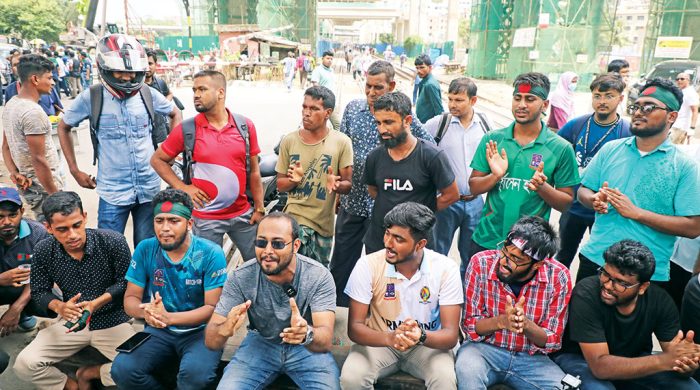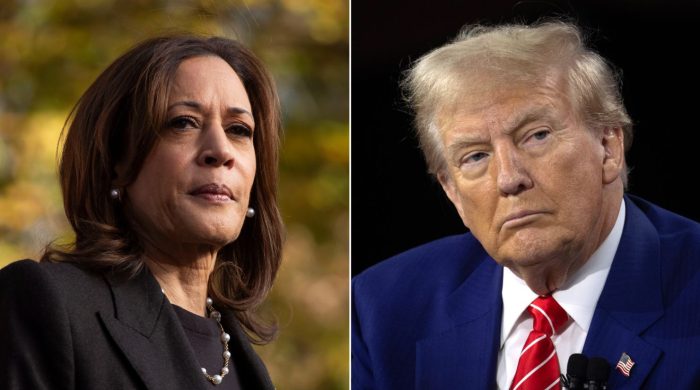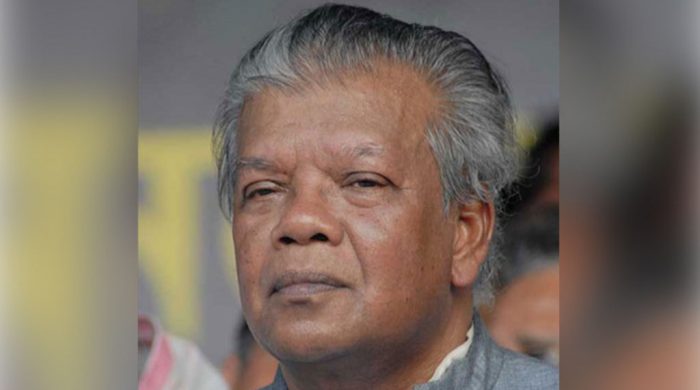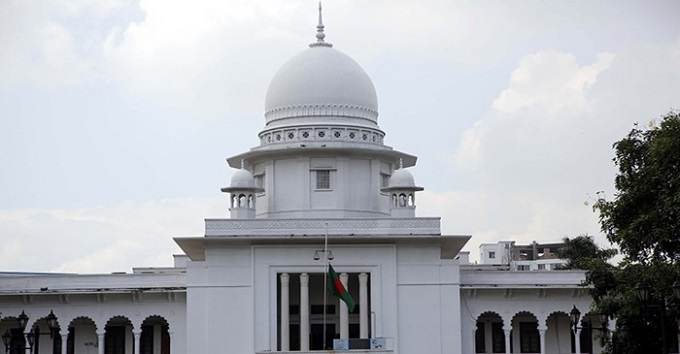Quota protesters want law, not litigation

- Update Time : Thursday, July 11, 2024
- 28 Time View

Students protesting for reform in the existing quota system in government services vowed to continue their movement despite the Appellate Division’s decision on Wednesday to stay for four weeks a High Court verdict that had asked the government to restore a 30 per cent quota for freedom fighters’ descendants.
The protesters welcomed the apex court order but said they would not leave the streets until the government assured them of fulfilling their demand.
The protesters demanded the government enact a law in parliament abolishing all quotas in the public services except for a five per cent quota for marginalised people.
‘We will continue our movement until our demand is met,’ Asif Mahmud, a co-coordinator of the Students Movement Against Discrimination, a platform for anti-quota students, said this while addressing a rally of students at Shahbagh crossing.
‘Our demand is very specific. We want specific directives from the executive department of the government that the existing quota problem will be resolved through forming a commission,’ he said before lifting their blockade from Shahbagh crossing at about 7:30pm.
Asif announced that students in Dhaka and other parts of the country would enforce their ‘Bangla Blockade’ programme at 3:30pm on all roads, highways and railways on Thursday.
Traffic in Dhaka and many other parts of the country collapsed on Wednesday as students enforced their all-out blockade to press home their demand.
Several thousand students of Dhaka University brought out a procession in front of the central public library and marched several places on the campus before blocking the Shahbagh crossing at about 11:50am.
While the students were holding the programme, the Appellate Division issued its order staying the High Court verdict.
The court asked the agitating students to return to their classrooms and appoint lawyers to place their arguments in court.
Ruling Awami League general secretary Obaidul Quader, meanwhile, said in a press conference on Wednesday that the quota issue would be resolved in court by the first week of August.
Students of different public universities and colleges held their protests for the 10th consecutive day on Wednesday, this time through a day-long blockade.
A group of people, identifying themselves as children freedom fighters, also held a rally in front of the of the national museum, demanding a 30 per cent quota for them.
Jahangirnagar University students blocked the Dhaka-Aricha highway between 10:30am and 6:30pm, Cumilla University students blocked the Dhaka-Chattogram highway between 11:00am and 3:00pm, Jatiya Kabi Kazi Nazrul Islam University students blocked the Dhaka-Mymensingh highway from 3:00pm to 5:00pm, Pabna Science and Technology University students blocked the Dhaka-Pabna highway from noon to 2:30pm, Begum Rokeya University students blocked Rangpur-Dhaka highway from noon to 2:30pm, Shahjalal University of Science and Technology students blocked Sylhet-Sunamganj highway from noon to 6:30pm, Barishal University and BM College students also blocked Dhaka-Barishal and Barishal-Kuakata highways, according to New Age correspondents in districts.
Rail communications between Dhaka and other places across the country were also disrupted due to the blockade.
Chittagong University students blocked the Dewan Hat Junction from around 10:00am to 2:00pm, and Bangladesh Agricultural University students blocked the rail track, halting the journey of the Dewanganj-bound ‘Teesta Express’ at Jabbarer Mor from 10:50am to 4:00pm.
Students of Dhaka University and other educational institutions in the capital Dhaka blocked rail tracks in the Karwan Bazar and Mohakhali areas from noon to 5:00pm.
‘All trains to and from Dhaka were left stranded in different places during the blockade,’ said Dhaka Railway station officer-in-charge Ferdous Ahmed Biswas.
Students also blocked major Dhaka crossings, including Gulistan, Shahbagh, Science Laboratory, Katabon, Banglamotor, Karwan Bazar, Agargaon, Mohakhali, and Rampura, leaving commuters suffering.
In some places, commuters were denied entry to metro rail stations by protesters.
Protestors also blocked the Dhaka Elevated Expressway in the Farmgate area.
The protestors, however, allowed emergency services, including ambulances and media vehicles, to operate.
‘Students will not return to their classrooms if their demand is not met,’ said Dhaka College student Nazmul Hasan, one of the coordinators of the movement, while blocking the Science Laboratory crossing in the afternoon.
Students rendered revolutionary songs, recited poems, and staged street plays while holding the blockade.
Students carried national flags, banners, and different placards that read ‘quota or merit’, ‘need logical reforms of quota’, and ‘no place of quota discrimination in golden Bengal.’
A significant number of protesters included female students who joined the protests with placards that read ‘quota is ridiculous when women are advanced’ or ‘I am a woman, I am not afraid of anything, I will conquer the world without quota.’
On October 4, 2018, the government issued a circular abolishing all 56 per cent quotas—30 per cent for freedom fighters’ descendants, 10 per cent for women, 10 per cent for people from underdeveloped districts, 5 per cent for ethnic communities; and one per cent for physically challenged people—in the civil service following student protests.

























